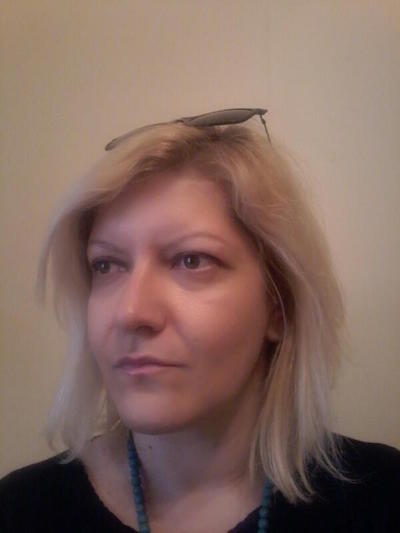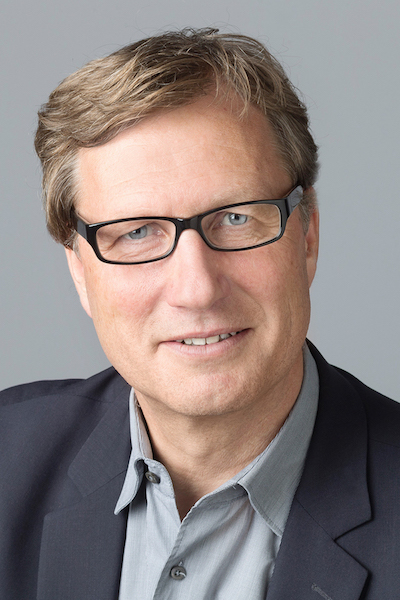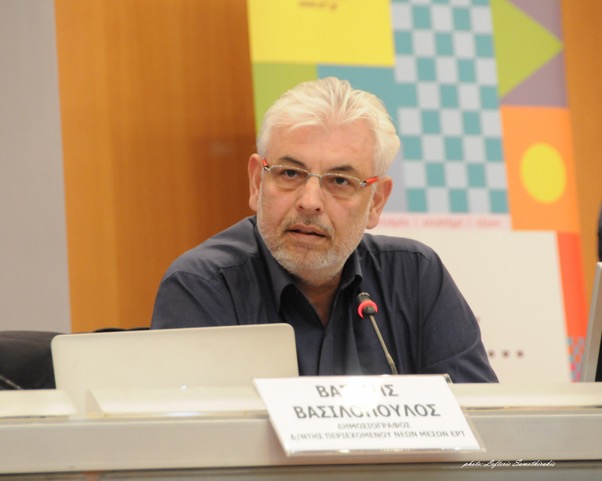Lost and not-yet-found: Trust in media
The technology of our time should enable us to reach new standards of journalism, but instead media across the world stands accused of divisive and politicised coverage. In an era of political polarization and populism, four journalists from Greece and Germany reflect on recent mistakes and consider how journalism can reach a higher standard, worthy of public confidence.
Far-right parties have gained ground across Europe, fuelled by polarising and populist rhetoric. In its coverage of controversial and international phenomena such as terrorism and the refugee crisis, the media has come under fire for detaching itself from classical values of journalism. The public – and some journalists – are concerned that the media has become a tool of polarisation, adopting a tone almost in tune with that used by politicians across the spectrum.
Lifestyles of the Right and the Famous
In October 2013, a member of Greece’s far-right political party, Golden Dawn confessed to the high profile murder of young anti-fascist rapper Pavlos Fyssas. Subsequently, key Golden Dawn MPs and members were arrested on suspicion of forming a criminal organisation. These events sparked a marked turn in the media’s coverage of Golden Dawn.
Up to that point, Greece’s media had granted the party’s time and space to present its members and ideology on comfortable terms. Eleftheria Koumantou, editor-in-chief of morning news at Athens 9.84FM and a member of the Greek Observatory Against Fascism and Racist Speech in the Media, has covered Golden Dawn since 2010. She says that before the controversy of 2013, the media played a major role in allowing the party to present a carefully curated image to the public.

“We saw several times (Golden Dawn MP and spokesperson) Kasidiaris’ bathrooms, (MP) Panayotaros’s wedding, (MP) Germenis with his wife. In an effort to convey a lifestyle model, the media did not go further into the substance of things. After Fyssas’ murder and the prosecutions, there was an overload of information by all media on the activity of Golden Dawn… Τhen its MPs went out and started talking about ‘septic tank TV channels’ and political persecution. They used their visibility to create polarization.”
In Germany on the other hand, the comparable far-right party, Alternative for Germany, has been under scrutiny from journalists since its establishment in 2013. But Mathias Müller von Blumencron, online editor-in-chief of Frankfurter Allgemeine Zeitung, says that approach came with its own consequences. He says that by focusing on the far-right and the far-left, the nation’s media missed the rise of populism brewing in the middle.

“We did not pay attention to the (central) right and the discontent that prevailed in society… We believed that the world was becoming more rational and that the power of ideology had been left behind, but we were wrong; and what we see today is a rebirth of nationalism, protectionism and other irrational movements.
Of course, the situation in Germany is greatly different from Greece. Greece has gone through one of the worst economic crises of the post-war period… I have always wondered what would happen in Germany if it were to slip into recession and have once again 5 million jobless people as it had 12 years ago. What would happen in such a case? Would people fall in love with extreme parties even more? This scares me.”
Too much talking, not enough reporting
Multimedia Content Director of the Hellenic Broadcasting Corporation, Vasilis Vasilopoulos headed the drafting of the Online Publisher Association of Greece’s Code of Ethics for Digital Media. He says in Greece, the media handled their country’s government-debt crisis poorly; a “mistake” that only widened political and societal divides.

“We have allowed populism to entrap the media. This interlinkage allows us to make conceptual or ideological circles so easily that we transfer masses from ‘yes’ to ‘no,’ from ‘no’ to ‘yes,’ from supporting the bail-out program to being against the bail-out program, and vice versa. Since we have been living in lies and recycling the lies, obviously we, the media, cannot seek to resolve this problem on our own. We have been part of it. We are a tool, and thus we cannot say that we will raise the flag.”
Vasilopoulos also points to excessive commentary in coverage of the 2015 referendum on proposed bailout conditions as a failure on the part of Greece’s media.
“They all became one, each pursuing their aims… no journalism, just commentary…Without any investigation, without any documentation; just views, just commentaries, an absolute sense of one side’s linkage with ‘yes’ and the other’s with ‘no.’”
The Refugee Crisis: taking sides and making turns
Viktoria Kleber, journalist for Deutsche Welle and Rundfunk Berlin-Brandenburg, has been covering the refugee crisis from Europe since the beginning of 2015 and has seen twists and turns in coverage of the issue.

“In the beginning of 2015 we were writing on anything related to the refugee issue. That was the period when we made the greatest mistakes. We had all put on the glasses of humanism instead of journalism. After the first three months, this changed, but I think we will be suffering for quite a while for the early journalism mistakes concerning the coverage of the story. There had been people who were sceptical against the open-border policy and their voice was not heard in any medium. We, journalists, would not take them seriously. We had turned our attention to people arriving to Germany. We were presenting only one side. What was happening had been unprecedented and emotionally intense for everyone. We lost our credibility and people lost their confidence in the media.”
For Müller von Blumencron, the refugee crisis story was underestimated during the first half of 2015.
“I think we were the first newspaper in Germany that approached the subject cautiously… Back then, we had all focused our attention on the Greek (debt) crisis. While we were dealing with Greece, though local newspapers were writing about the problems in the cities due to the ever-increasing number of refugees. When some solution was found for the Greek (debt) issue in July, refugees became the central story.
So, I would say that initially the coverage had been rather naïve. Media have been very slow in dealing with the real issue. We did not pay the attention needed and we didn’t hear those who were feeling uncomfortable with this wave of migration. This changed completely in the following months. After the event, though, we are all smarter than before.”
Koumantou remembers pro-refugee and pro-migrant language in Greece’s coverage from early 2015 until March 2016, when the EU entered a deal with Turkey aimed at stopping irregular sea crossing from Turkey to the Greek islands. Then, Koumantou says, the media’s tone changed to be consistent with the country’s new policy.
“When the borders started closing, the ‘health bomb’ suddenly came back. ‘Refugees’ became ‘migrants’ again. Since the Greek Government set up the hot spots, (migrants and asylum seekers) all became ‘illegal.’”
For Vasilopoulos, this ‘turn’ in coverage demonstrates the role media plays in responding to and forming public opinion.
“We have a vocation to keep confirming that we are right to be optimistic or that we are right to be afraid. We have opted for the second in our days, and fear is part of our storytelling… Here is the role of the media, which has never been different… (media has always) been the key vehicle by which propaganda from powerful mechanisms was channelled, moulding consciences, lifestyle trends, the American dream, the fear for any evil that would deprive us of our well-being etc.”
The search for lost confidence
A special Eurobarometer on the topic of Media Pluralism and Democracy in 2016 identified some troubling trends. Across the European Union, 44 percent of Europeans think mass media does not provide trustworthy information. The respective percentage is 26 percent in Germany, and 73 percent in Greece.
According to the survey, almost nine in ten Greeks (87 percent) do not believe that mass media is free from political or commercial pressure. The respective percentage in Germany is 44 percent.
A Reuters survey carried out in 36 countries across the world and with more than 70,000 respondents also found that 33 percent of respondents don’t trust the news they read, see and hear to be true. The head of that survey, Nic Newman commented, **“Fake news could be the best thing that has happened to journalism in a long while. It is an opportunity to re-establish the value of mainstream brands and focus on quality.”
The Reuters survey also showed that half of the Germans trust their media and feel they are free from political and commercial pressure. Greeks, on the other hand, showed the lowest levels of trust in their national media, ranking last among the 36 countries. Furthermore, Greece is the only country where its citizens think social media is better able to separate fact from fiction compared to the traditional media.
Once lost, confidence and trust is hard to claw back. What can journalists today do to avoid mistakes and improve their coverage? A return to classic principles of journalism seems to be a common answer.
A message from Reuters’ editor-in-chief Steve Adler to staff following the election of US President Donald Trump in 2016, said the best way to cover the new American administration is to follow the same rules they have always followed and stay loyal to the same values. Similarly, Müller von Blumencron supports a return to classical journalistic values, noting suspicion towards journalists is nothing new.
“I started journalism in the mid-eighties and I remember my professor back then telling us that we are choosing a very tough profession. Journalists have never been stars. However, fortunately in Germany we still have very powerful, very independent mass media. Public confidence in those media is high. Of course, there are always sceptics out there who do not trust us… no matter what you write, people don’t believe you. I think we have to live with it and be as accurate as possible – more accurate than we used to be – (and) to stay calm and, of course, not be influenced by criticism.”
Of course Müller von Blumencron recognises the media should take criticism where it’s valid.
“(If) we made a mistake, then we have to admit it, correct it and apologise. But when we are right, when our facts are correct and people believe we are wrong then we have to stick on our position and our political judgment. I mean, there is coverage of a story, and there is commentary. Commentary is an opinion. An information organization is not always praised by its readers for the comments it makes. Sometimes, though, provoking its readers is good.”